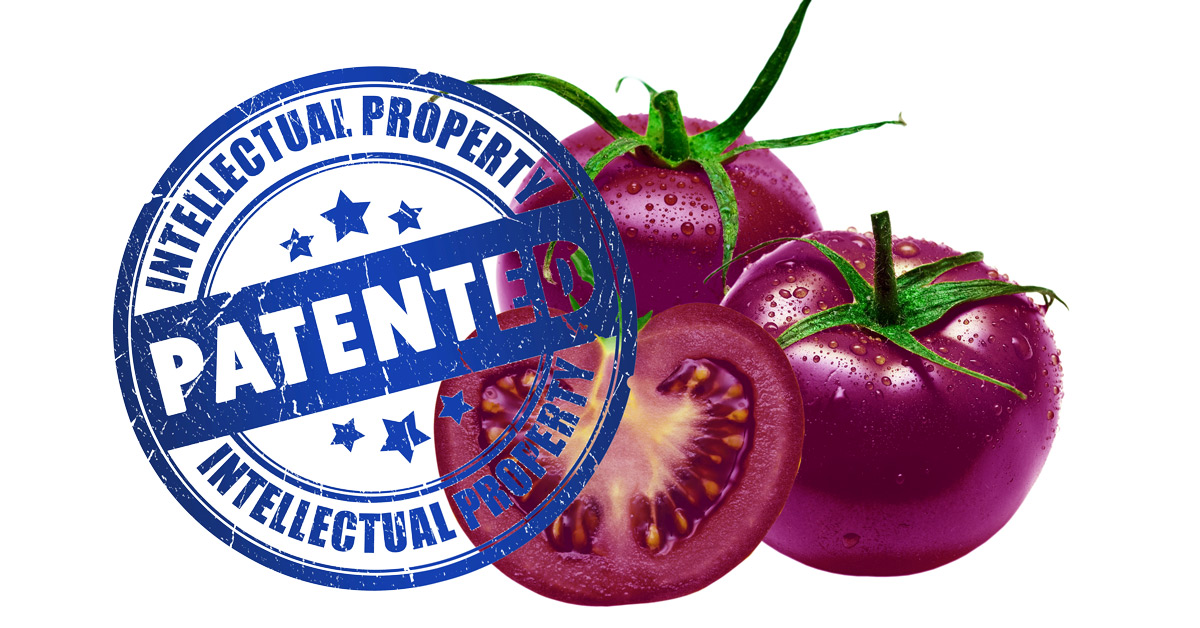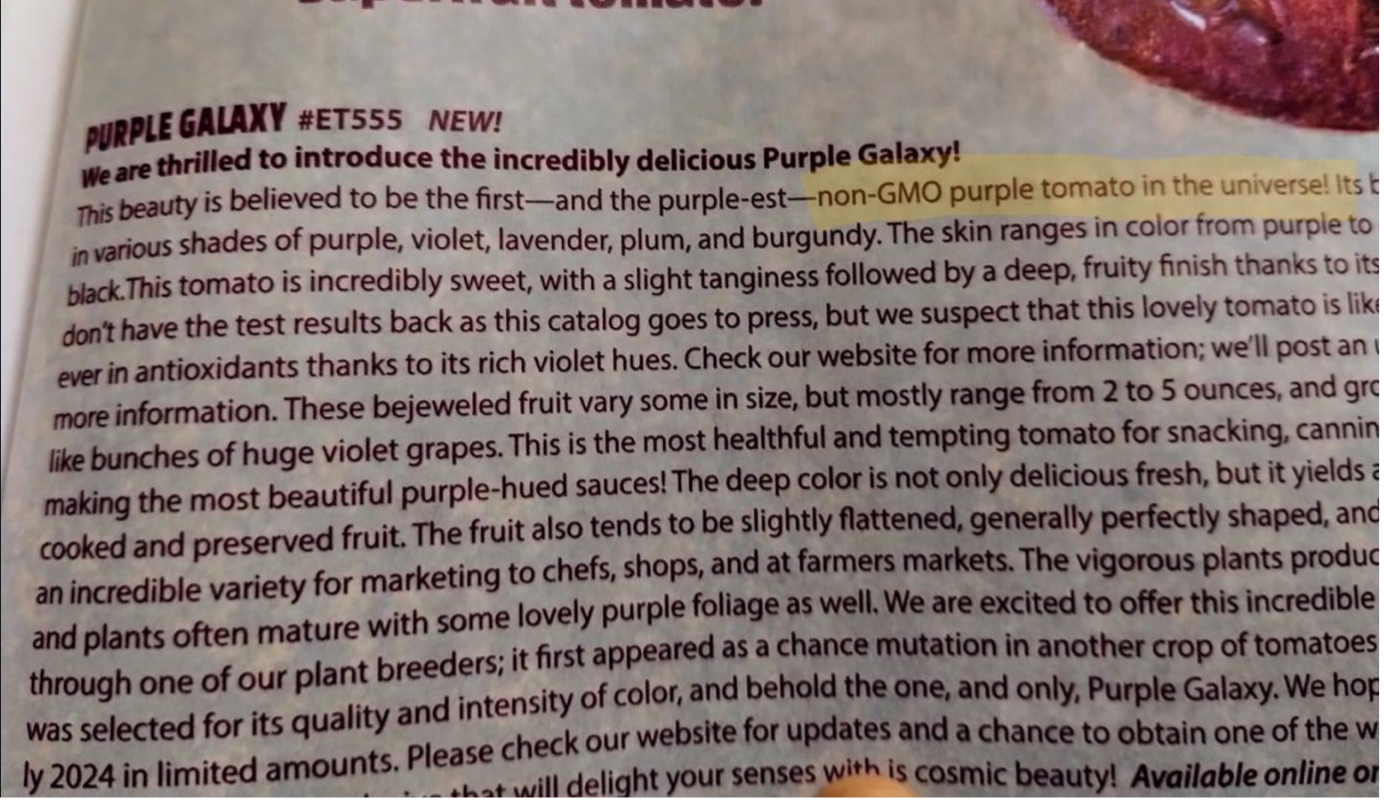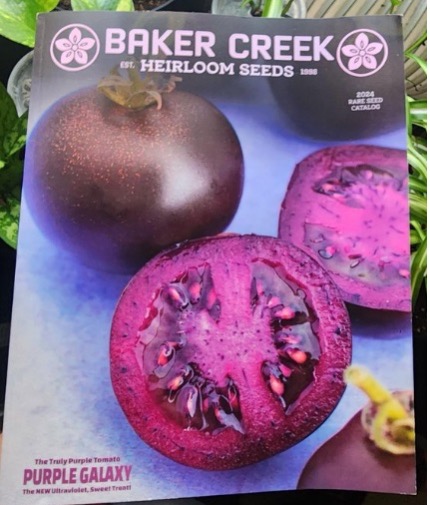
Plant breeders and seed retailers are increasingly living in fear of legal threats from GMO developer companies. Report: Claire Robinson
The company that is commercialising the GM purple so-called “anti-cancer” tomato has targeted a non-GMO heirloom seed company over alleged patent infringement.
In its 2024 catalogue, Baker Creek Heirloom Seed Company in the US offered a “non-GMO purple tomato”, the Purple Galaxy. It even featured on their catalogue’s cover.


Baker Creek said it was then contacted by Norfolk Healthy Produce, the US subsidiary of Norfolk Plant Sciences. Norfolk Healthy Produce, in Baker Creek’s words, “expressed concern that the Purple Galaxy might have been derived from its patented genetically engineered tomato”.[1] Baker Creek withdrew the Purple Galaxy seeds, saying, “Subsequent laboratory testing conducted in conjunction with Norfolk did not conclusively establish a relationship between the Purple Galaxy and Norfolk’s GM purple tomato. Indeed, such contamination should be unlikely in Europe, given its approach to GM crops. But the testing also did not conclusively establish that the Purple Galaxy is truly free of any genetically modified material.”[2]
Baker Creek also stated that it “remains steadfast in its commitment to selling only heirloom and open-pollinated, non-Genetically Modified (‘non-GM’) varieties”.[3]
Baker Creek insists that it did its due diligence: “We sourced the seed for the Purple Galaxy from a plant breeder in Europe – where GM tomatoes are not approved – who has collected rare tomato seeds for decades and grows more than 1,000 varieties of tomatoes annually. We actively followed his attempts to breed a purple flesh tomato over the course of three years. In the beginning, using two varieties, he had a fruit that was definitely not purple; it was a purplish red with a few purple streaks. Cultivating five generations over three years, he ultimately had a beautiful tomato with purple skin and flesh. We then travelled to Europe to see the plants for ourselves.”[4]
However, C.S. Prakash, who runs the pro-GMO AgBioWorld website,[5] accused Baker Creek of lying and deliberately stealing Norfolk Plant Sciences’ patented germplasm. With the tone that we have come to expect from avid GMO proponents, Prakash tweeted on Twitter/X: “Liar, liar… your pants on fire! How Bakers Seeds simply swiped some GMO purple tomato seeds from Norfolk Plant Sciences, gave it a fancy name and marketed it as heirloom tomato to its gullible customers! @BigPurpleTomato”.[6]
In a Facebook post, a woman called Heidi Morgan suggested that Baker Creek’s supplier had lied to them about the claimed GMO provenance of the tomato. Baker Creek responded: “No, they had no idea, it was a case of unintentional contamination”. This response contradicted Baker Creek’s earlier statement that the GMO testing results were inconclusive and seemed to suggest that the company believed that the Purple Galaxy really was GMO-contaminated.[7]
Norfolk Plant Sciences, quoted in the mainstream agricultural media outlet AgDaily, unambiguously said the Purple Galaxy was GMO: “Given its remarkable similarity to our purple tomato, we prompted Baker Creek to investigate their claim that Purple Galaxy was non-GMO. We are told that laboratory testing determined that it is, in fact, bioengineered (GMO). This result supports the fact that the only reported way to produce a purple-fleshed tomato rich in anthocyanin antioxidants is with Norfolk’s patented technology. We appreciate that Baker Creek tested their material, and after discovering it was a GMO, removed it from their website.”[8]
In the absence of either Baker Creek or Norfolk Plant Sciences posting the lab results publicly, it is impossible to know whether they showed the Purple Galaxy was GMO or not. The lack of transparency on the part of these companies is regrettable and contrary to the interests of breeders, GMO developers, and the public alike.
However, either possibility – that the tomato was GMO or non-GMO – is extremely concerning, for reasons that have been ignored by both the pro-GMO lobbyists accusing Baker Creek of GMO seed piracy and by Norfolk Plant Sciences.
If the Purple Galaxy is in fact GMO and the seeds really did come from Europe, where the GM purple tomato has not been authorised for release into the food chain or for commercial cultivation, then Norfolk Plant Sciences appears to be guilty of a biosafety breach. Cathie Martin’s GM purple tomato would have been only permitted to be grown in secure conditions at the John Innes Centre in the UK. By law, the seeds of a non-authorised GMO must not enter the food chain or the seed supply. Unless Baker Creek’s supplier physically broke into John Innes Centre’s supposedly secure test site, it could not have accessed the GMO purple tomato seeds unless Norfolk Plant Sciences broke the law and leaked them, either accidentally or deliberately.
If the Purple Galaxy is GMO and Baker Creek knowingly bought GM Purple Tomato seeds from Norfolk Healthy Produce and passed them off as non-GMO and Purple Galaxy, this would mean that Baker Creek was indulging in a blatant fraud that would be certain to be exposed, given the very public profile Baker Creek gave the Purple Galaxy and the litigious nature of GMO developer companies and their obvious interest in defending their patents. In other words, Baker Creek’s management would have to be not just criminal but insane (something we highly doubt).
If the Purple Galaxy is non-GMO, the implications are even more worrying. This would mean that Norfolk Plant Sciences could have been
i) persecuting a seed company for spurious reasons and thereby ramping up fear of litigation in plant breeders and seed retailers, potentially paralysing the sector and quashing innovation in breeding, and/or
ii) falsely claiming that in contradiction of the reported experience of the European breeder, the only way – ever – to produce a purple-fleshed tomato is via its patented GM genes. If Norfolk’s claim is taken at face value, this means that no one can ever breed their own purple-fleshed tomato without fear that the company will come after them for patent infringement. Norfolk Plant Sciences does not admit to the possibility that it may be the one guilty of biopiracy, for exploiting potentially naturally occurring genes and patenting them. Interestingly, the testing company didn’t find the obviously GM transgenes they looked for in their first testing (probably the snapdragon genes), but then Norfolk “suggested additional genes to test for”. Baker Creek says these results were inconclusive – maybe GM, maybe not.[9] So were these definitely GM transgenes, or genes that may be found in the GM purple tomato but which are naturally occurring? If the latter, they should never have been patented. European law, correctly interpreted, does not allow patents on naturally occurring genes – though the European Patent Office is under severe criticism for allowing such patents in violation of the law. It has accepted broad wording in patents that covers patented traits obtained by genetic engineering methods or other means, including conventional breeding.[10]
Breeders' patent fears
Plant breeders are becoming increasingly fearful of inadvertently infringing the patents of seed companies, in particular those of the large multinationals, which have taken to sending threatening letters to the breeders, warning them of the consequences of using their intellectual property.
For example, an article called “Laying claim to nature’s work: Plant patents sow fear among small growers” describes the experience of Adaptive Seeds, an organic seed company that does not use any form of intellectual property rights; anyone can openly save and share their seed varieties. The article reports: “In April 2020, the company received a letter from BASF, a German multinational chemical company and the owner of Nunhems, the fourth-largest vegetable breeding company in the world. The letter did not directly accuse Adaptive Seeds of using patented material, but did list varieties of seeds and traits Nunhems had patented. It was an ominous reminder of just how many traits and varieties BASF has control over.”
Founder Andrew Still said, “There’s always a general concern that one day they’re going to decide we’re selling something that they think is theirs and they’re going to sue us over that."
The article explains that the consolidation of the seed industry that has occurred since the early 2000s has concentrated the patented ownership of valuable plant germplasm in the hands of a few multinationals: “Today, just four companies – Bayer, DowDupont/Corteva, ChemChina-Syngenta and BASF – control over 60% of the seed market worldwide.[11] Bayer alone owns over 20 different varieties of lettuce, some of which the company has owned for over a decade. Each patent has an extensive list of the variety’s traits and characteristics.
“The system rewards powerful firms with the resources to develop and enforce patents, explained Phil Howard, a professor in the department of community sustainability at Michigan State University. As patent law is complicated and ambiguous, many small-scale breeders don’t know if the seeds they want to work with are patented or not. He said this stifles their freedom to experiment.
“Some of these big firms will intimidate seed breeders into believing that there are broad patent claims on many seeds, when in fact there aren’t. So the current lack of transparency and the complexity really gives massive advantages to these big firms and really hinders the smaller firms.”[12]
Another article, “We’re losing our seed breeders”, reported, “Because private sector breeding often results in patents, public breeders are unable to experiment with most seeds a private breeder produces – leaving some wary. ‘The privatization of actual genetic traits is really troubling,” said [Chris Smith, executive director of the Utopian Project, a nonprofit that focuses on crop diversity in the food and farm system]. I should be allowed to work with purple carrot genetics without worrying about being sued. And that’s not our current reality, which is really scary to me.’”[13]
Baker Creek controversy
GMWatch does not present this episode between Baker Creek and Norfolk Plant Sciences as a simplistic “David vs Goliath” narrative of the innocent and heroic “little guy” against the evil larger corporation. After all, Baker Creek is a well established company with an annual turnover of several million dollars.[14] It is also no stranger to controversy, having even been accused of racism and the biopiracy of Indigenous seeds.[15] We make no judgement about those allegations – others closer to the situations will know far more than us – but as a general principle, we unequivocally condemn racism and biopiracy, whoever the perpetrators may be.
However, we believe this episode should be considered in terms of what it says about the increasing restrictions on plant breeders and smaller seed retailers that are being imposed by patent-owning GMO developer corporations. It is a chilling reminder of the threat that these smaller actors face from the increasing number of patents on GM traits – and, thanks to the violation of patent rules by some patent-granting offices, on non-GM traits too.
We are also concerned that this situation will rapidly escalate due to the potential flood of patented GM seed that may result from the weakening of GMO regulations around the world. Companies will take advantage of the lack of regulatory oversight and labelling requirements on seed produced using new GM techniques like gene editing to rush more products into commercialisation.
That is bad news for plant breeders, seed companies, and all of humanity. We will all suffer from the increasing corporate ownership of valuable germplasm that has been developed by the efforts of farmers and non-GMO breeders over the centuries and millennia, but is now being claimed as the exclusive property of GMO developer companies.
Notes
1. Baker Creek Heirloom Seed Company Facebook post (2024). 19 Feb. https://www.facebook.com/rareseeds/posts/pfbid0k3R5xH5359hqPaP3Vmx6sF8gK3a4Xu4rSCsUw6Cz6J5gE4mqSXoe1bdR29uHsEa2l
2. Baker Creek Heirloom Seed Company Facebook post (2024). 19 Feb. https://www.facebook.com/rareseeds/posts/pfbid0k3R5xH5359hqPaP3Vmx6sF8gK3a4Xu4rSCsUw6Cz6J5gE4mqSXoe1bdR29uHsEa2l
3. Rare Seeds (2024). FAQ: Baker Creek discontinues Purple Galaxy tomato seeds. https://www.rareseeds.com/faq
4. Baker Creek Heirloom Seed Company Facebook post (2024). 19 Feb. https://www.facebook.com/rareseeds/posts/pfbid0k3R5xH5359hqPaP3Vmx6sF8gK3a4Xu4rSCsUw6Cz6J5gE4mqSXoe1bdR29uHsEa2l
5. AgBioWorld (2011). About AgBioWorld. Accessed 8 Mar 2024. https://twitter.com/i/lists/1561751668819099648
6. C.S. Prakash X page (2024). https://twitter.com/i/lists/1561751668819099648
7. AgBioWorld Facebook page (2024). 21 Feb. https://www.facebook.com/100064267076167/posts/798189198999975/
8. AgDaily (2024). Seed catalog throws tantrum after listing GMO tomato by accident. 20 Feb 2024. https://www.agdaily.com/news/seed-catalog-throws-tantrum-after-listing-gmo-tomato-by-accident/
9. Baker Creek Heirloom Seed Company Facebook post (2024). 19 Feb. https://www.facebook.com/rareseeds/posts/pfbid0k3R5xH5359hqPaP3Vmx6sF8gK3a4Xu4rSCsUw6Cz6J5gE4mqSXoe1bdR29uHsEa2l
10. No Patents on Seeds! (undated). What is the problem? Accessed 11 Mar 2024. https://www.no-patents-on-seeds.org/en/background/problem
11. Prof Phil Howard and his colleague Amos Strömberg have made visual graphics of seed industry consolidation from 2003–2022. They note, “Colossal changes have placed the majority of agrochemical and seed sales globally under the control of six firms by the early 2000s… and subsequent “megamergers” reduced this to just four firms by 2018.” See: Strömberg A, Howard PH (2023). Recent changes in the global seed industry and digital agriculture industries. 4 Jan. https://philhoward.net/2023/01/04/seed-digital/
12. Scotten M (2024). ‘Laying claim to nature’s work’: plant patents sow fear among small growers. The Guardian, 25 Jan. https://www.theguardian.com/environment/2024/jan/25/plant-patents-large-companies-intellectual-property-small-breeders
13. Swenson S (2023). We’re losing our seed breeders. Ambrook Research, 19 May. https://ambrook.com/research/crops/public-seed-breeders-land-grant-universities-agribusiness?emci=54d8b662-1895-ee11-8925-002248223f36&emdi=709f856c-fd95-ee11-8925-002248223f36&ceid=2017884
14. KonaEquity.com (2024). Baker Creek Heirloom Seed Co. https://www.konaequity.com/company/baker-creek-heirloom-seed-co-4391230437/
15. See: http://www.theredneckhippie.com/2019/04/baker-creek-seeds-supports-racism.html ;
https://www.rootsimple.com/2019/05/baker-creek-invites-then-un-invites-cliven-bundy-to-speak/ ;
https://www.instagram.com/p/CnkLj5HLuW_/?hl=en&img_index=1
Images of the Baker Creek catalogue are from: https://www.reddit.com/r/gardening/comments/18cdg99/this_came_today_they_sent_me_2_of_them/










